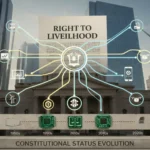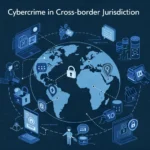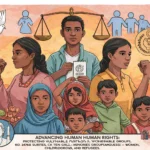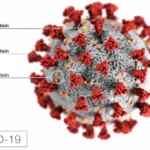ROLE OF COPYRIGHT FOR THE FASHION INDUSTRY IN INDIA
ROLE OF COPYRIGHT FOR THE FASHION INDUSTRY IN INDIA Author (s) Karma Thinlay Yolmo Full Text PDF Download Table of…




Latest Post
 Right to Livelihood: Has the constitutional status evolved to accommodate the needs of current economy?
Right to Livelihood: Has the constitutional status evolved to accommodate the needs of current economy?
 G20 Leadership in Combating Climate Change: Challenges, Progress, and the Road Ahead
G20 Leadership in Combating Climate Change: Challenges, Progress, and the Road Ahead
 Cybercrime in Cross-Border Jurisdictions: Challenges and Solutions
Cybercrime in Cross-Border Jurisdictions: Challenges and Solutions
 Advancing Human Rights: Protecting Vulnerable Groups – Women, Children, Minorities, and Refugees
Advancing Human Rights: Protecting Vulnerable Groups – Women, Children, Minorities, and Refugees
 Custodial Violence in the Context of Human Rights
Custodial Violence in the Context of Human Rights
 Intellectual Property Rights in the Digital Era
Intellectual Property Rights in the Digital Era
 ROLE OF GATEKEEPERS ON THE EFFECTIVENESS OF CORPORATE GOVERNANCE
ROLE OF GATEKEEPERS ON THE EFFECTIVENESS OF CORPORATE GOVERNANCE
 IMPACT OF COVID-19 IN INDIA: AN AWFUL HISTORY STILL IN THE MAKING
IMPACT OF COVID-19 IN INDIA: AN AWFUL HISTORY STILL IN THE MAKING
 A STUDY ON HATE CRIME: HOW PREJUDICE MOTIVATES VIOLENCE
A STUDY ON HATE CRIME: HOW PREJUDICE MOTIVATES VIOLENCE

 Right to Livelihood: Has the constitutional status evolved to accommodate the needs of current economy?
Right to Livelihood: Has the constitutional status evolved to accommodate the needs of current economy?
 G20 Leadership in Combating Climate Change: Challenges, Progress, and the Road Ahead
G20 Leadership in Combating Climate Change: Challenges, Progress, and the Road Ahead
 Cybercrime in Cross-Border Jurisdictions: Challenges and Solutions
Cybercrime in Cross-Border Jurisdictions: Challenges and Solutions
 Advancing Human Rights: Protecting Vulnerable Groups – Women, Children, Minorities, and Refugees
Advancing Human Rights: Protecting Vulnerable Groups – Women, Children, Minorities, and Refugees
 Custodial Violence in the Context of Human Rights
Custodial Violence in the Context of Human Rights
 Intellectual Property Rights in the Digital Era
Intellectual Property Rights in the Digital Era
 ROLE OF GATEKEEPERS ON THE EFFECTIVENESS OF CORPORATE GOVERNANCE
ROLE OF GATEKEEPERS ON THE EFFECTIVENESS OF CORPORATE GOVERNANCE
 IMPACT OF COVID-19 IN INDIA: AN AWFUL HISTORY STILL IN THE MAKING
IMPACT OF COVID-19 IN INDIA: AN AWFUL HISTORY STILL IN THE MAKING
 A STUDY ON HATE CRIME: HOW PREJUDICE MOTIVATES VIOLENCE
A STUDY ON HATE CRIME: HOW PREJUDICE MOTIVATES VIOLENCE

ROLE OF COPYRIGHT FOR THE FASHION INDUSTRY IN INDIA Author (s) Karma Thinlay Yolmo Full Text PDF Download Table of…
A STUDY ON HATE CRIME: HOW PREJUDICE MOTIVATES VIOLENCE Author (s) Abhidha H P Full Text PDF Download Table of…
IMPACT OF COVID-19 IN INDIA: AN AWFUL HISTORY STILL IN THE MAKING Author (s) JHA PRANAV KUMAR Full Text PDF…
This course explores the intersection of AI and law, covering regulations, ethics, data protection, intellectual property, and real-world legal applications.
This course trains participants in legal drafting skills, covering pleadings, contracts, conveyancing, writs, and opinions through practical exercises and expert guidance.
This course provides practical HRM training covering recruitment, onboarding, performance management, compliance, workplace ethics, and essential skills for aspiring HR professionals.
LRA Legal Services Pvt. Ltd. (CIN: U85499UP2024PTC207221) | DPIIT-Recognized Startup | Copyright © 2026